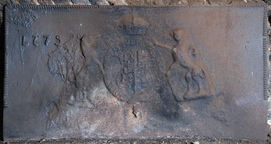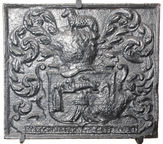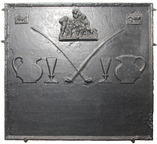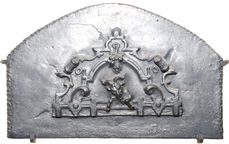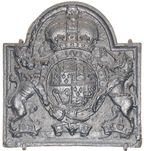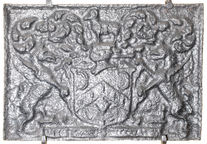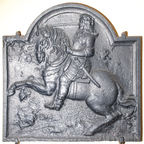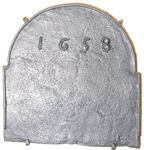-
515
Description: Rectangular; rope edging (top & sides); in centre, Tudor shield, garter, crown and supporters (greyhound and lion); date top left.
Notes: The armorial achievement is seen on other firebacks and was formed from four separate stamps (one example has the shield and garter inverted); the supporters are consistent with the date; the style of the numerals is uncharacteristic of the period. The same date in identical form is on a similar fireback at Groombridge Place, Speldhurst, Kent (no. 1226).
Inscription: 1579 / HONE SOVT qVEY MAL Y PENSE
Arms: Tudor royal (prob. Elizabeth I)
- Decoration tags:
- rectangular (shape)
- rope (edging)
- carved stamps
- date stamp
- armorial
- royal
- text
Manufactured: in the late-16th century in the Weald area of England.
Current location: Penshurst Place, Penshurst, Kent, England.
-
517
Description: Rectangular; ogee within broad fillet moulded edging; top centre, date between split initials, with small diamonds between date and initials and outside initials.
Inscription: T 1665 S
- Decoration tags:
- rectangular (shape)
- fillet and ogee (edging)
- text
Manufactured: in 1665 in the Weald area of England.
Current location: Penshurst Place, Penshurst, Kent, England.
- Attached to series:
- Date & initials firebacks
-
546
Description: Rectangular; ovolo edging; shield, helm, crest, mantling and motto of the Merchant Taylors’ Company: Argent a Pavilion Imperial Purple garnished Or lined Ermine between two Mantles also Imperial Purple lined Ermine on a chief Azure a Lion passant guardant Or.
Notes: Arms were re-granted to the Company in 1586; the excrescences on the helm and shield are probably the result of splashes caused when pouring the iron into the mould from too great a height. Mitford collection, Petworth House.
Inscription: CONCORDIA PARVAE RES CRESCUNT [In Harmony Small Things Grow]
Arms: Worshipful Company of Merchant Taylors
- Decoration tags:
- rectangular (shape)
- ovolo (edging)
- whole carved pattern
- armorial
- text
Manufactured: in the late-16th to early-17th century possibly in the Weald area of England.
Current location: Petworth House, Petworth, West Sussex, England.
Museum number: NT/PET/M/101 (part of the National Trust museum group)
- Attached to series:
- Livery company firebacks
-
551
Description: Rectangular; ovolo-moulded edging; top centre, stamp formed of a carved domestic scene of a family around a table, between two small mirrored rectangular stamps each of a cow; lower centre, symmetrical arrangement of two jugs, two goblets and two crossed churchwarden pipes, all in low relief.
Notes: The domestic group has been formed from a decorative iron mantelpiece ornament portraying the tale of the goose that laid golden eggs. Having killed the goose, the family are lamenting the loss of their bounty (see Ames, 1980, p.94). The style of the fireback suggests a pastiche using designs suggesting the past. The same mantelpiece group can be seen as decoration on the kitchen spit assemblage at Petworth House, West Sussex, which was cast at Robert Chorley's foundry at Cocking, south of Midhurst. Evidently this and another fireback bearing the same ornament stamp were among items from the Cowdray estate sold in 1898. Mitford collection, Petworth House.
- Decoration tags:
- rectangular (shape)
- ovolo (edging)
- carved stamps
- animals
- humans
- objects
Manufactured: in the early-19th century probably at Cocking Foundry in the Weald area of England.
Current location: Petworth House, Petworth, West Sussex, England.
Museum number: NT/PET/M/43 (part of the National Trust museum group)
Citation: Ames, A., 1980, Collecting Cast Iron (Ashbourne, Moorland Publishing).
- Attached to series:
- Cocking foundry firebacks
- Ornament stamp firebacks
- Metalware stamp firebacks
-
558
Description: Arched rectangular shape; fillet edging; top centre, stamp formed of a carved domestic scene of a family around a table; in top corners, repeated small stamp of St George and the Dragon; below, repeated stamp of a pineapple in a pot; centre; small stamp of the royal arms of the United Kingdom 1801-37.
Notes: The domestic group has been formed from a decorative iron mantelpiece ornament portraying the tale of the goose that laid golden eggs. Having killed the goose, the family are lamenting the loss of their bounty (see Ames, 1980, p.94). The same mantelpiece group and pineapple stamp can be seen as decoration on the kitchen spit assemblage at Petworth House, West Sussex, which was cast at Robert Chorley's foundry at Cocking, south of Midhurst. Evidently this and another fireback bearing the same ornament stamp were among items from the Cowdray estate sold in 1898. Mitford collection, Petworth House.
Arms: Royal arms of the United Kingdom 1801-37
- Decoration tags:
- rectangular with round arch (shape)
- fillet (edging)
- carved stamps
- armorial
- royal
- animals
- humans
- plants
Manufactured: in the early-19th century probably at Cocking Foundry in the Weald area of England.
Current location: Petworth House, Petworth, West Sussex, England.
Museum number: NT/PET/M/50 (part of the National Trust museum group)
Citation: Ames, A., 1980, Collecting Cast Iron (Ashbourne, Moorland Publishing).
- Attached to series:
- Cocking foundry firebacks
- Ornament stamp firebacks
- Metalware stamp firebacks
-
559
Description: Arched rectangle with crude scalloping around the edges; elaborate, symmetrical strapwork frame with scrolls top left and right, and below, a bunch of grapes hanging from the top, and the head and forelegs of a goat climbing through; inside each upper scroll, a small astragel edged oval.
Notes: This strap-work stamp, characteristic of late-16th and early-17th century architectural drawings and engravings and derivative of the work of artists like Hans Vredeman de Vries, was probably derived from interior carving on a fireplace overmantel or similar. The goat and bunch of grapes suggest an allusion to Bacchus. Marks round the edge of this fireback suggest that it may have been reduced from a larger size. Mitford collection, Petworth House.
- Decoration tags:
- rounded arched (shape)
- scalloped (edging)
- simple stamps
- architectural
- animals
- plants
- objects
Manufactured: in the late-16th to early-17th century possibly in the Weald area of England.
Current location: Petworth House, Petworth, West Sussex, England.
Museum number: NT/PET/M/53 (part of the National Trust museum group)
- Attached to series:
- Miscellaneous stamp firebacks
-
563
Description: Arched rectangular shape; cavetto edging; Stuart royal arms of England (quarterly, 1st and 4th, France and England, 2nd Scotland and 3rd Ireland) with garter, crown, motto and supporters; initials either side of crown base.
Notes: As in others of this series the design overlaps the edging. Mitford collection, Petworth House. Copies were advertised in Longden & Co.'s (Sheffield) catalogue c.1911, and inferior copies in Kings Worthy Foundry's (Winchester) catalogue in the mid-20th century.
Copies of this fireback are known.
Inscription: C R / ...SOIT QVI MAL Y ...
Arms: English Stuart royal
- Decoration tags:
- rectangular with round arch (shape)
- cavetto (edging)
- whole carved pattern
- armorial
- royal
- text
Manufactured: in the mid- to late-17th century in the Weald area of England.
Current location: Petworth House, Petworth, West Sussex, England.
Museum number: NT/PET/M/57 (part of the National Trust museum group)
-
522
Description: Rectangular; cavetto-moulded edging; shield, helm, crest, supporters, mantling and motto of the Worshipful Company of Clothworkers: Sable a chevron ermine between in chief two Havettes Argent and in base a Teazel Cob Or; crest: on a Mount vert a Ram statant Or; supporters: two Griffins Or pellettée.
Notes: The arms as displayed were granted in 1587; the same fireback was also used as a stamp for a large fireback of 1659 in Haslemere Museum (no. 108). Mitford collection, Petworth House.
Arms: Worshipful Company of Clothworkers
- Decoration tags:
- rectangular (shape)
- cavetto (edging)
- whole carved pattern
- armorial
Manufactured: in the early- to mid-17th century possibly in the Weald area of England.
Current location: Petworth House, Petworth, West Sussex, England.
Museum number: NT/PET/M/76 (part of the National Trust museum group)
- Attached to series:
- Livery company firebacks
-
523
Description: Arched rectangular shape; cavetto-moulded edging; figure in mid-17th century armour, sword in belt, riding a prancing horse; initials split, below corners of arch, in front of horse’s head and behind rider’s back.
Notes: Probably intended to represent Charles I in memoriam, as other firebacks in this style date from the end of the Commonwealth period. Mitford collection, Petworth House. Copies of this fireback were advertised in the Wayte & Cheverton (Edenbridge) catalogue in the early-20th century, and inferior copies in Kings Worthy Foundry's (Winchester) catalogue in the mid-20th century.
Copies of this fireback are known.
Inscription: [C missing] R
- Decoration tags:
- rectangular with round arch (shape)
- cavetto (edging)
- whole carved pattern
- pictorial
- text
- animals
- humans
Manufactured: in the mid-17th century in the Weald area of England.
Current location: Petworth House, Petworth, West Sussex, England.
Museum number: NT/PET/M/77 (part of the National Trust museum group)
Citation: Baines, J. M., 1958, Wealden Firebacks (Hastings Museum).
Citation: Lloyd, N., 1925, 'Domestic Ironwork I', Architectural Review, 58, pp. 58-67.
- Attached to series:
- Small cavetto series
- Miscellaneous royal firebacks
-
532
Description: Arched rectangular shaped with narrow shoulders; fillet edging; date in individual numerals across arch.
Notes: A smaller version is different in the spacing of the numerals and the proportions of the plate. Mitford collection, Petworth House.
Inscription: 1658
- Decoration tags:
- rectangular with round arch (shape)
- rope (edging)
- carved stamps
- individual numbers
- text
Manufactured: in 1658 possibly in the Weald area of England.
Current location: Petworth House, Petworth, West Sussex, England.
Museum number: NT/PET/M/85 (part of the National Trust museum group)
- Attached to series:
- 1658 arched series
- Date only firebacks
